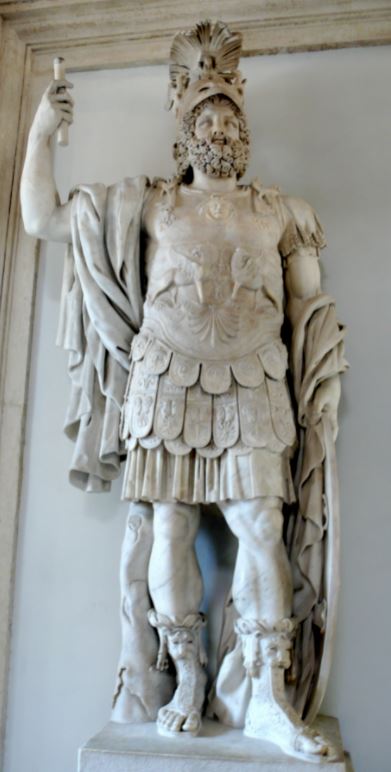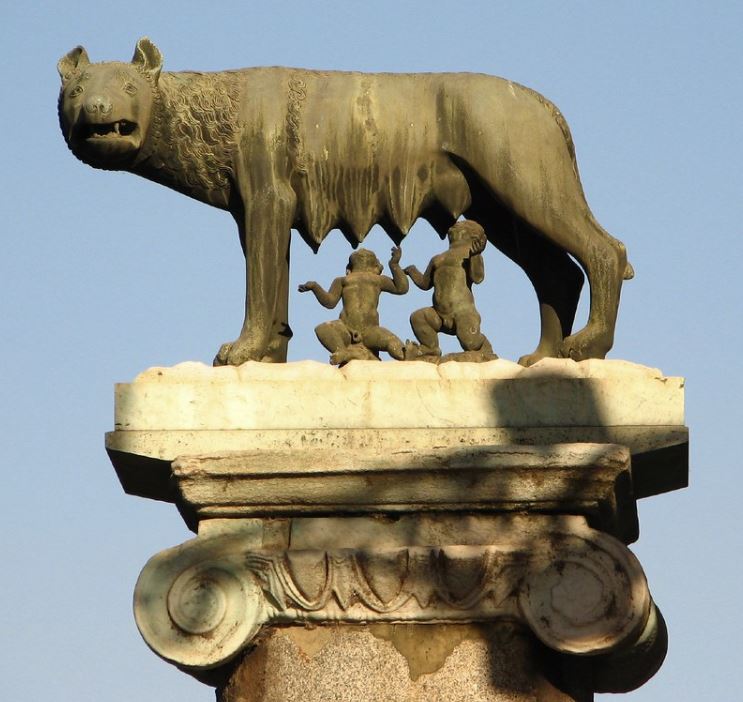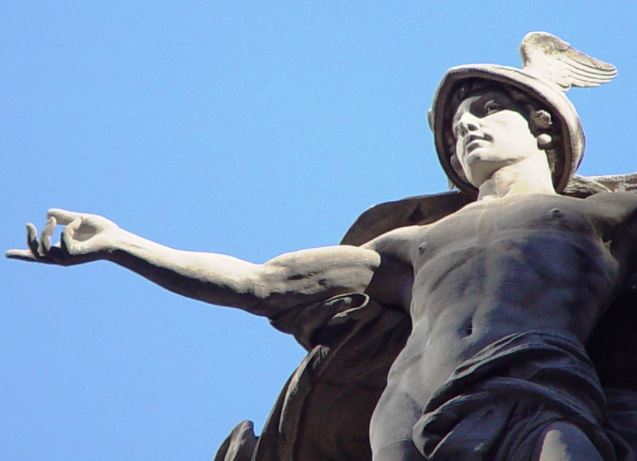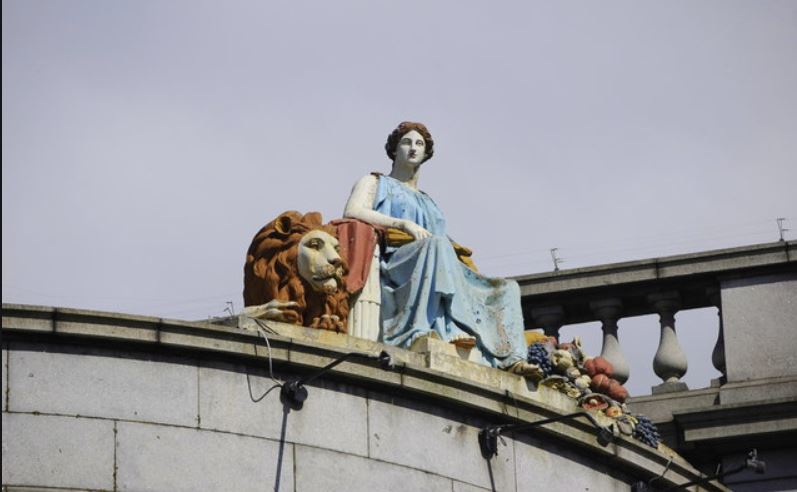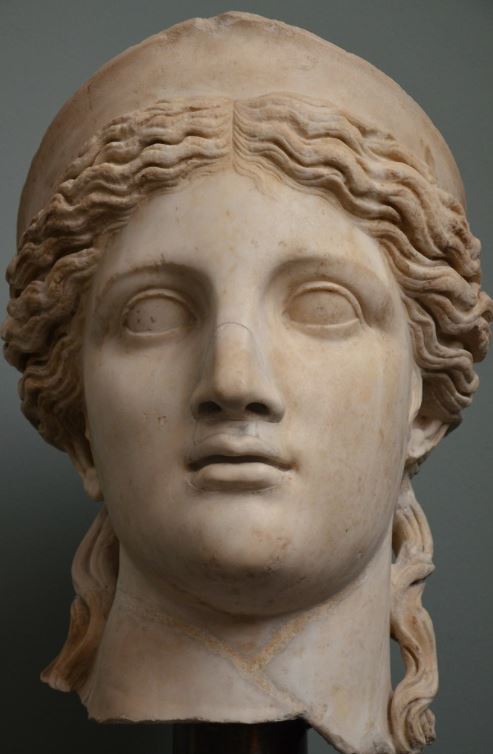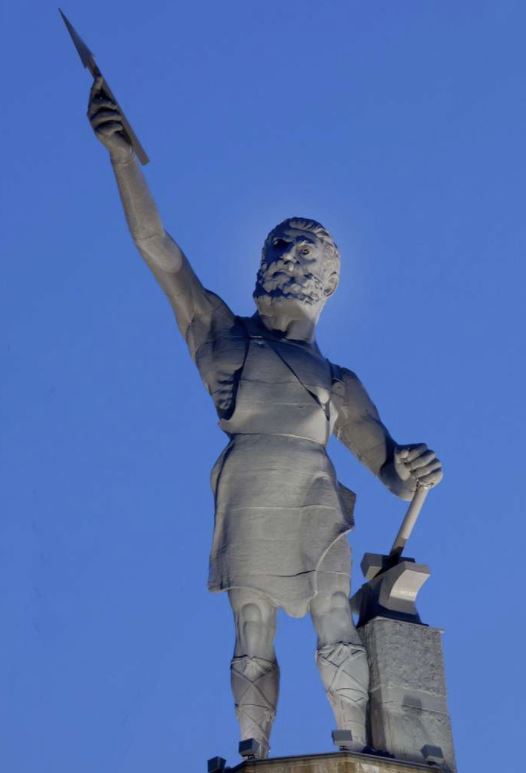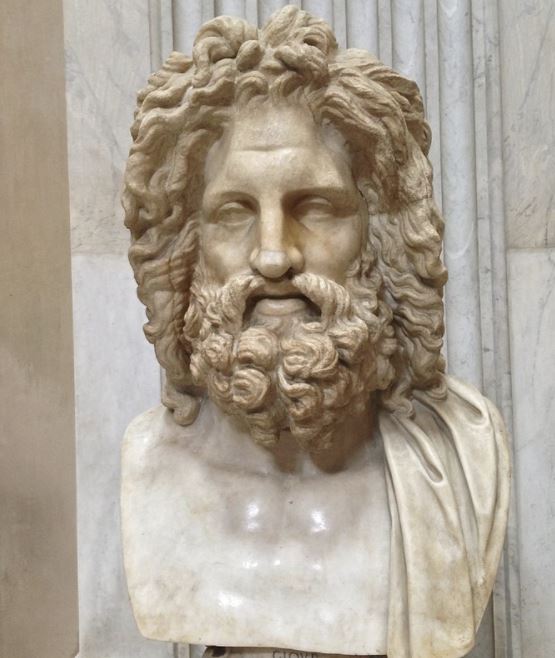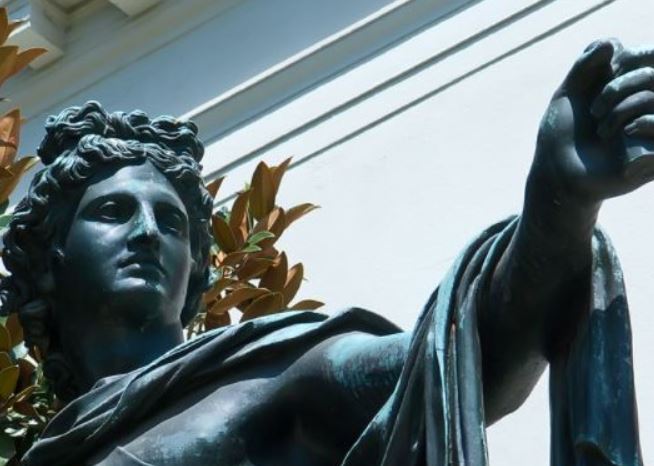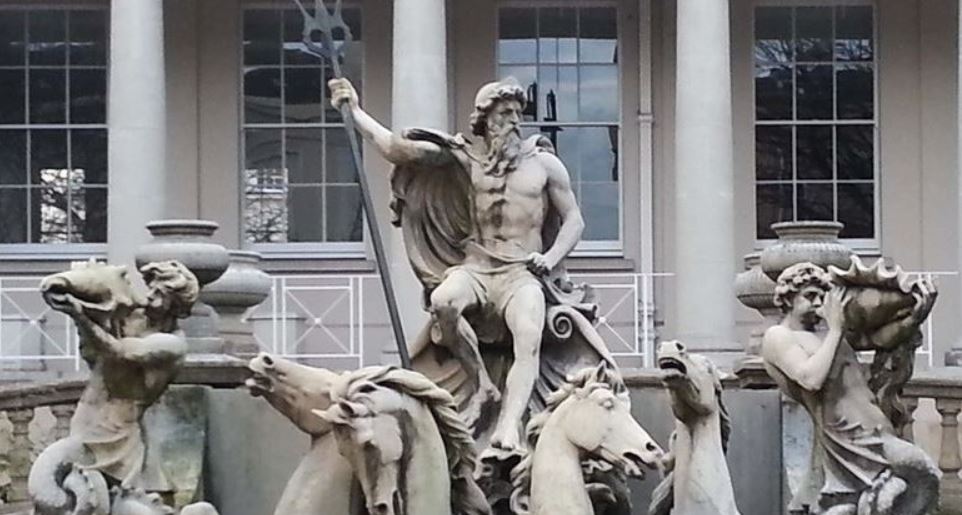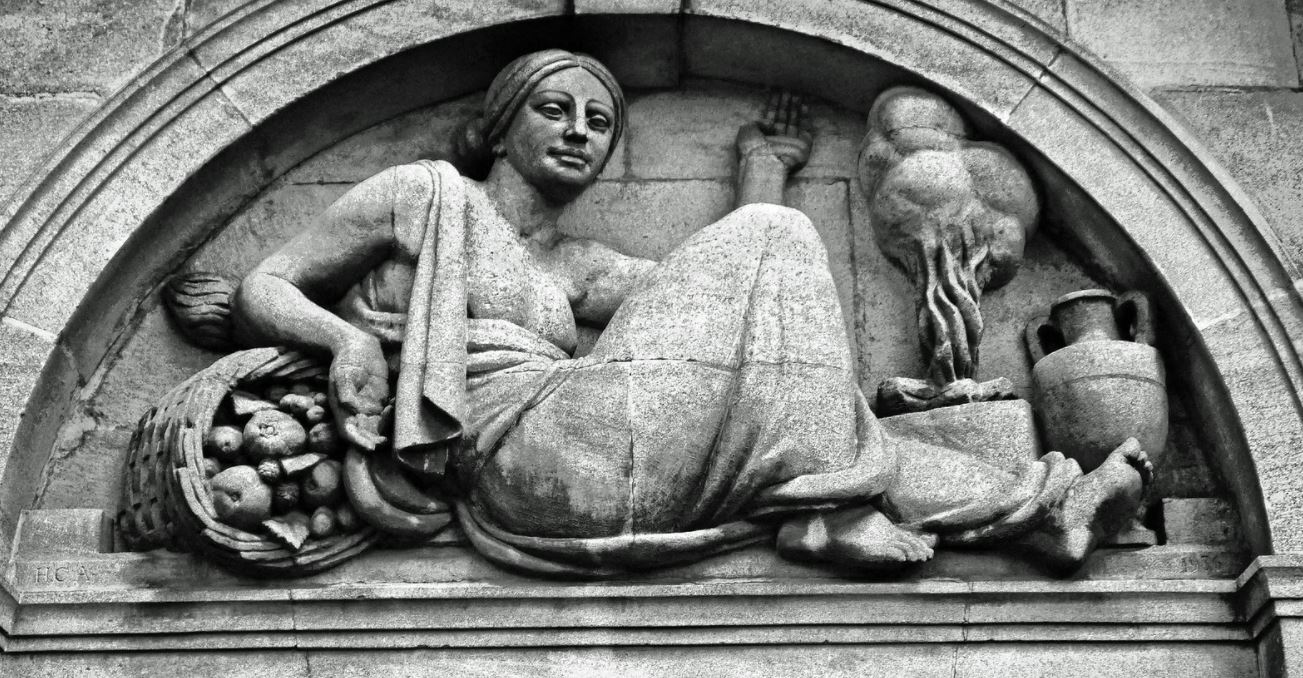The Roman God Mars of War
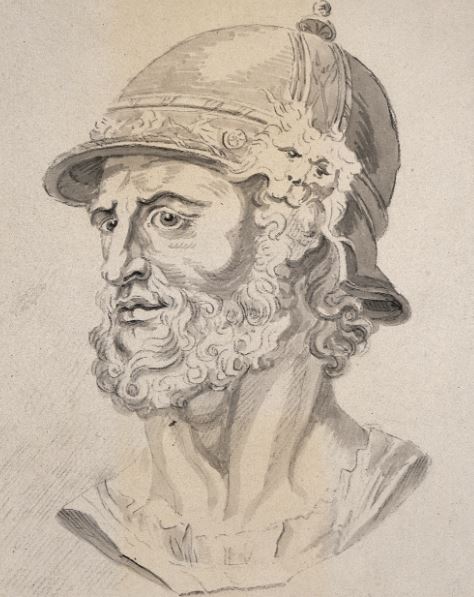
In ancient times, war was not an uncommon event in the history of civilization.
The biggest empires, such as the Romans, considered war something normal, so they dedicated a deity to this event. The name of this god was Mars.
What is Mars the god of?
Mars was the Roman god of war and the protector of agriculture.
The main festivities celebrated in his honor occurred in March and October, in correspondence with the beginning and the ending of military and agricultural activities.
Actually, the month of March took its name from the Roman god Mars and was once the first month in the Roman calendar. Since the birth of the Roman god Mars was remembered on the first day of March, in the initial times of Roman history Mars’s birth coincided with the beginning of the year, a fact which testifies his importance among ancient Romans.
Like many other Roman deities, at some point the Roman god Mars was identified with a Greek god: the myths and attributes of the Hellenic divinity of war Ares were then referred to as Mars the Roman god of war.
Anyway, the Roman god Mars conserved some peculiarities which distinguished him from his Greek counterpart.
Mars god statue
For example, his role of guardian of agriculture had no correspondence in Greek mythology. Besides, while Ares was seen as a destructive force, and as such often condemned and blamed in Greek culture, Mars Roman god of war instead was usually a positive entity for Romans: war was in fact considered by them as a way to preserve peace.
The war god Mars played an important role in the genuinely Roman myth of the foundation of Rome: he was in fact the father of the mythological founder Romulus.
This eventuality is probably the one that most contributed to the respect tributed to him by Romans. Mars was usually depicted wearing a helmet or holding his main symbol, the spear.
Many animals were sacred to him, the most important being the woodpecker, the wolf, and the bear. Since those are creatures inhabiting the wildlands, they would represent another aspect of the Roman god Mars, i.e. his feral nature.
The bear is one of the animals that was linked to the Roman god Mars
The Roman god Mars: Origin of the Name
The name of the Roman god Mars could be related to the Oscan “Mamers” or to “Maris”, which was the name of an Etruscan child god.
These interpretations are not universally agreed upon anyway, and the origin of the name of the god Mars remains debated by scholars.
History of Mars Roman god of war and Most Important Myths Related to Him
According to most sources, the Roman god Mars would have been the son of Jupiter and his wife Juno.
He would have had as wife the war goddess Nerio but was often depicted as the lover of the Roman goddess of love Venus. As we anticipated in the introduction, the Roman god Mars is an interesting figure for scholars of ancient Roman culture because he is the main character in some uniquely Roman myths.
Let’s see in greater detail the most important of them: the myth describing the foundation of Rome.
The Foundation of Rome and the paper of Mars god of war
This story begins in a settlement named Alba Longa, situated somewhere near the actual location of the city of Rome.
Alba Longa would have been founded by the legendary father of the Roman nation, Aeneas, the son of Venus, and its kings would have been his descendants.
At the time of the story, the legitimate king Numitor had been displaced by his brother Amulius. The latter would have also killed Numitor’s son, and forced her daughter, Reha Silvia, to become a vestal virgin, so to make sure that Numitor’s lineage would have died.
Anyway, the Roman god Mars raped Reha Silvia and impregnated her with two twins: Romulus and Remus. They were abandoned in a chest in the Tiber river but were found by a she-wolf that cared for them, granting their survival.
A statue of Romulus and Remus, sons of the Roman god Mars while being taken care of by a she-wolf
Romulus and Remus grew up to become strong men and were able to restore Numitor to the throne of Alba Longa. Therefore, they decided to found a new city, which would have become Rome.
During the foundation rite, a dispute between them was born, at the end of which Romulus killed Remus. This is the reason why Romulus alone was worshipped as the founder in Roman tradition.
This tale was of great importance for ancient Romans since it presented them as the perfect synthesis of two opposite, primordial natural forces: in the veins of Romulus, in fact, the blood of Venus, the goddess of femininity and sensuality, was mixed to the blood of the Roman god Mars, the god of masculinity and strength.
Powers of the Roman god Mars
In the grand pantheon of ancient Roman mythology, Mars stands out as a figure of immense might and valor. The roman god Mars embodied several powers that extended beyond the battlefield and influenced various aspects of Roman life and culture.
Roman god Mars powers: Authority over War
Mars’ most defining power was his divine authority over war. As a martial deity, he held command over conflict and violence, guiding Roman armies towards victory. He was often invoked for strength, protection, and strategy during wartime, making him a central figure in Roman military life.
Yet, Mars was not solely a god of destructive war but also of military strategy and discipline, symbolizing the dual nature of martial affairs.
Roman god Mars powers: Protection
Interestingly, Mars was also deemed the guardian of agriculture, a vital aspect of Roman society.
This connection might seem paradoxical, but it reflects the intertwined relationship between war and agriculture in ancient times: seasons of conflict and periods of peace and cultivation were cyclical aspects of Roman life. Mars’ power, thus, extended to fertility, growth, and the protection of fields, a stark contrast yet complement to his martial prowess.
Mars also held the unique power of being the divine father of the Roman people.
As the father of Romulus and Remus, the mythical founders of Rome, Mars became a symbol of the Roman state’s strength and longevity. This ancestral aspect further emphasized Mars’ significant influence over Rome’s existence and destiny.
The powers of Mars as an individual
As the god of war, Mars was clearly considered to possess supernatural strength and vigor.
His connection with the wilderness, anyway, seems to suggest that he was once associated with natural phenomena, too.
In origin, he might have been a deity of thunders and storms, whose destructive powers had to be propitiated somehow. This hypothesis seems to be justified by some rituals described by early Roman writers, whose goal was to prevent the wild forces of Nature, of whom Mars god of war was seen in power, from ruining the crops in the cultivated fields.
One of the pictures of the Roman god Mars
Mars god Symbols and Their Meanings
As we said, the main Mars god of war symbol was often represented holding a spear. Its meaning is quite clear, being Mars associated with war.
Less obvious is maybe the meaning of some of the wild animals sacred to him: while the wolf and the bear can easily be seen as symbols of fierce and strength, the meaning of the woodpecker might seem more mysterious.
Surprisingly enough, this bird was instead the animal most tightly linked to the war god Mars. Let’s see the reasons in detail.
Roman god Mars symbol: The Woodpecker
Despite its little size, the woodpecker was considered a strong animal, capable to reach the inmost part of the tree with its powerful beak.
Besides, this bird was thought to be the guardian of a sylvatic plant, the peony, which was used to treat disorders of the digestive and of the female reproductive system.
The woodpecker, therefore, embodied the two different aspects of Mars the Roman god: his strength and his connection with vegetation. Interestingly, it seems also to suggest a link between Mars and female nurture which, while rarely underlined, is also present in an alternative version of the myth describing Mars’s birth.
The woodpecker: one of Mars god of war symbols
The association of the woodpecker to the Roman god Mars was so strong that it seems that Romans had even given Mars’s name to a particular species, the Picus Martius.
Additional Mars Roman god Facts
We have said that the Roman god Mars is generally considered to be a son of Jupiter and Juno.
Another interesting version of the myth of Mars’s birth, anyway, was given by the Roman poet Ovid in his poem Fasti.
According to Ovid’s version, the god Mars would have been conceived by Juno without the intervention of Jupiter, nor of any other man or god. In fact, since Jupiter had usurped her motherly role giving birth to Minerva from his head, she decided to ask Flora, the Roman goddess of flowers and spring, a way to become pregnant without having intercourse with Jupiter.
Flora was able to produce a magical flower having the desired power. She tested it on a female cow which soon became pregnant, then she gave it to Juno so that she could reach her goal.
Such a particular tale cannot be found in any other source apart from Ovid. Scholars are in doubt about whether to consider it an invention of the poet, or rather an archaic Italic myth that would have otherwise been forgotten.
It is noteworthy that the story is used by Ovid to underline a link between the Roman god Mars, the plants, and the female reproductive system since a similar connection had been suggested while talking about the woodpecker as one of the main symbols of Mars.

